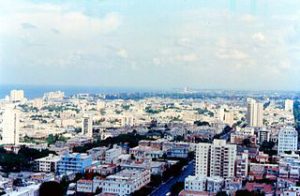
The International Port Corp, a Miami-based shipping company, is the first US company to open a staffed office in Cuba since restrictions on US trade with Cuba have been eased.
A number of companies have applied for and have been given licenses from the US government to open operations in Cuba, but so far only IPC has followed through. Owner and President of IPC, Larry Nussbaum, said that his company rented a warehouse in Havana from the government of Cuba. It is staffed with six employees who were hired by a Cuban government employment agency. IPC pays the employment agency.
“The opportunities are great. Cuba is open for business,” Nussbaum said. “Now we need the American legislation to make it legal for companies like mine to expand what we can legally do in Cuba.”
IPC was first awarded their license to ship between Miami and Havana in July 2012 on humanitarian grounds. Since that time Nussbaum has expanded his company to also include commercial shipments and cargo for diplomats, by air and sea.
Despite the lifting of restrictions there has not been a serious upsurge in shipments to Cuba because Cuba is not buying too much from the US right now. The main problem is that the US embargo does not allow the offer of credit to Cuban purchasers of US products, so there is no competition in the market.
“The growth of my business is dependent on the U.S. making more activities legal,” Nussbaum said.
